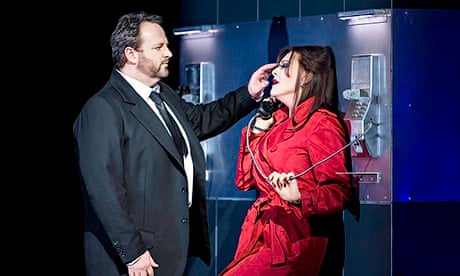Artistic director David Pountney's themed spring season Fallen Women gives Welsh National Opera a neat package. Puccini's Manon Lescaut, Henze's Boulevard Solitude and Verdi's La Traviata are all linked by Abbé Prévost's 1731 scandalous novel; in La Traviata, Dumas' courtesan, Marguerite (Violetta), receives it from her lover as an early cautionary gift. The connections invite new reflections on the age-old theme. Yet taking on a Manon Lescaut staging (Mariusz Treliński's production was first seen in Brussels a year ago) that shifts the 18th-century action to the present seems to defeat the object of pairing the Puccini with Henze's modern telling of the story.
Boris Kudlicka's single set – which will presumably do duty for Boulevard Solitude in two weeks' time – is a railway station, making the whole opera a sequence of arrivals and departures. They are relived in Des Grieux's flashback nightmares (he is asleep on a station bench). His first defining glimpse of Manon in her tarty red mac is more film noir than Brief Encounter, but it is less grim than the nightclub setup of rich, old sleaze-bag Geronte, for whom Manon abandons Des Grieux. But neither the ritual degradation of young women, the sadistic, golf club-wielding Grim Reaper, the glittered-up girl group nor the minuet with a mannequin succeed in shedding light on the lovers' characters or their plight. Manon's arrest (for stealing jewels, though none were seen) is made nonsensical, and with it the reason for her deportation to Louisiana. By the time of the final act and her flight with Des Grieux into the Louisiana desert, it's not so much their fate that is heartbreaking, but the dearth of directorial logic. The perversity of Trelinski's concept is only underlined by the surtitles, which accentuate the disjunction between what is sung and what actually happens on stage.
By way of counterbalance, conductor Lothar Koenigs presides over a highly respectable realisation of the composer's vision for Manon, often bringing a sumptuous breadth to the WNO orchestral lines. In the title role, soprano Chiara Taigi has some lovely sounds in the middle of her range, but overall the melodramatic approach forces everything too far. While their duets have the sweep of later vintage Puccini, Taigi's solo arias are never as convincing as those of Gwyn Hughes Jones's Des Grieux. Caught between passion and frustration, Jones nevertheless sustains the tone with admirable control to the bitter end, making this a notable debut in the role. David Kempster's Lescaut and Stephen Richardson's Geronte are horrible but strong.

Comments (…)
Sign in or create your Guardian account to join the discussion